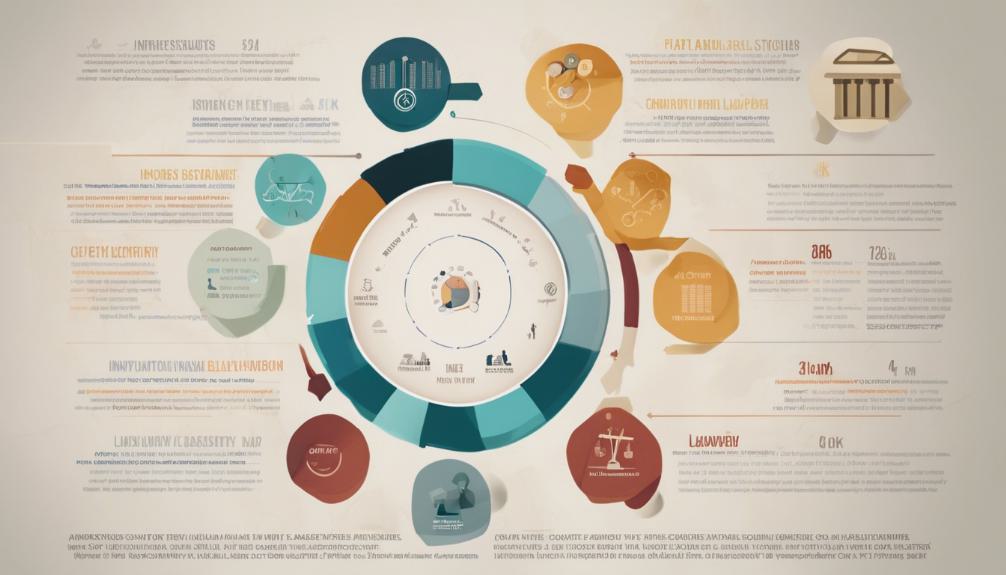Personal Injury Lawsuit Timelines and Outcomes: What to Expect
If you've had the misfortune of experiencing an 'unexpected twist' in your day due to a personal injury, you're likely starting a journey filled with legal complexities and decisions. Sailing through the waters of a personal injury lawsuit involves understanding timelines that can stretch from a few months to over a year and predicting possible outcomes. You're not just fighting for justice; you're also aiming for compensation that reflects your losses. Knowing the ins and outs of filing your claim, from the statute of limitations to the factors influencing the duration and outcome of your lawsuit, is critical. Let's explore what lies ahead, providing you with the foresight to steer through this process effectively.

Key Takeaways
- Personal injury lawsuits typically resolve within months to 2 years, influenced by various factors.
- Winning a lawsuit ensures the defendant pays for injuries and losses, possibly in a lump sum or structured settlement.
- If a lawsuit is lost, the plaintiff may not receive compensation and could be responsible for certain expenses.
- Personal injury settlements are generally not taxable, allowing accident victims to keep the full amount without deductions.
Injury Statistics Overview

Annually, the National Safety Council reports that 55 million injuries occur, costing billions in damages and highlighting the widespread impact of personal accidents. You're not alone if you've suffered an injury due to someone else's negligence. Every case is unique, influenced by differing circumstances that affect the outcome. It's important to understand that the statute of limitations for filing a claim varies by state, ranging from 1 to 4 years. Knowing your state's deadline is essential because missing it can have significant implications. Prompt action not only guarantees accuracy but also minimizes the risk of forfeiting your right to compensation. Remember, there's no set timeline for how long a personal injury lawsuit takes, with resolutions typically reached within months to 2 years depending on various factors and procedures across states.
Filing Your Claim

Understanding the significance of the statute of limitations and the impact of injuries, it's imperative you know how to properly file your personal injury claim. Initially, you'll need to gather evidence related to your case. This includes medical records, photos of the injury, and any witness statements. Next, you should consult with a personal injury lawyer who can offer expert advice tailored to your case's specifics.
Your lawyer will then draft and file a complaint on your behalf, officially starting the lawsuit process. It's essential you're thorough and accurate during these steps, as missing details can jeopardize your claim. Remember, each step taken towards filing your claim is a move towards securing the compensation you deserve for your injuries and losses.
Statute of Limitations

The statute of limitations is a critical deadline you must meet to file your personal injury claim successfully. This period varies by state, ranging from 1 to 4 years. It's essential you're aware of your state's specific timeline. If you miss this deadline, you're likely forfeiting your right to sue for damages, no matter how valid your claim might be. Understanding this timeframe is vital as it affects your ability to seek compensation for injuries sustained. Don't wait until it's too late; familiarize yourself with the statute of limitations in your state as soon as possible after an injury. Missing this window could mean losing out on potential compensation, leaving you to bear the financial burden of your injuries alone.
Early Filing Advantages

Initiating your personal injury lawsuit early can greatly improve the accuracy of evidence and bolster your case. By acting promptly, you're likely to access and gather detailed evidence while it's still fresh. This can include medical records that detail the immediate impact of your injuries, eyewitness accounts that haven't faded with time, and any surveillance footage that might be overwritten or lost. Early filing demonstrates your seriousness and commitment to pursuing justice, potentially influencing the defendant's willingness to settle. It also gives you ample time to navigate the complexities of legal proceedings, ensuring you don't rush through important decisions. Remember, the strength of your case often hinges on the quality and timeliness of the evidence you present.
Lawsuit Duration Factors

Several factors can greatly influence how long your personal injury lawsuit might take to resolve. The complexity of your case is a major determinant. Simple cases with clear liability may settle quickly, while disputes over fault or severe injuries often require more time. The workload of the court system in your jurisdiction can also play a role; busier courts might delay your case's progress. Additionally, your willingness to settle can affect the timeline. If you're open to negotiation, you might wrap things up faster than if you're set on going to trial. Finally, the defendant's response matters. A cooperative defendant might lead to a swifter resolution, whereas a resistant one could prolong the process.
Winning the Case

When you win a personal injury lawsuit, you're entitled to compensation for your injuries and losses. This victory means the court has found the defendant liable for the harm you've suffered. You'll receive a settlement, determined either through negotiation or by the court, which covers medical expenses, lost wages, and possibly pain and suffering. Typically, the defendant pays either in a lump sum or through a structured settlement, allowing for periodic payments. It's important to understand that personal injury settlements aren't taxed, so you keep the entire amount awarded. Remember, winning your case is an important step towards recovery, both physically and financially, ensuring you're compensated for the hardships you've endured.
Losing the Case

If you lose your personal injury lawsuit, you won't receive compensation for your injuries or losses. This outcome means you'll also be responsible for your own medical expenses and any legal fees incurred during the case. Without the expected compensation, covering these costs can be financially challenging. Additionally, you might need to explore alternative methods to manage your financial obligations, such as insurance claims or personal savings. It's important to understand that losing a case doesn't always reflect the quality of your claim but rather the complexities and unpredictabilities of legal proceedings. Quality legal representation is essential in navigating these challenges, offering guidance on possible next steps, including the potential for an appeal if there are grounds to challenge the court's decision.
Settlement Taxation

Understanding the tax implications of your personal injury settlement is pivotal, as most settlements are not taxable, but there are exceptions. Generally, the IRS doesn't tax personal injury settlements because it views this money as compensation for your injuries, not income. However, you'll find exceptions when it comes to punitive damages, which are meant to punish the defendant rather than compensate you. These are taxable. If your settlement includes interest accrued while the case was pending, that interest is taxable too. It's also worth noting that if you've deducted medical expenses related to the injury on previous tax returns, your settlement might affect those deductions. Always consult a tax professional to navigate these waters, ensuring you don't get hit with unexpected taxes.
Privacy of Settlements

Regarding the privacy of personal injury settlements, it's important to know that most are negotiated out of court and hence remain confidential. This privacy means the details of your settlement, including the amount and any conditions, aren't made public. It's a critical aspect for many, as it allows for a more discreet resolution to potentially sensitive issues. You'll often sign a confidentiality agreement, ensuring that both parties keep the terms private. This can be particularly beneficial if you're concerned about public perception or simply wish to keep your financial matters personal. Remember, while the specifics of the settlement stay between you and the defendant, you're free to disclose the fact that a settlement was reached if you choose.
Case Dismissal Implications

When your personal injury case is dismissed, you're left without the compensation you might have relied on to cover your losses. This setback can feel overwhelming, especially when you're already dealing with the physical and emotional aftermath of an injury. It's important to understand that a dismissal doesn't always mean the end of your pursuit for justice. However, it does signify that, for now, you won't receive the financial support you anticipated for medical bills, lost wages, and other related expenses. You'll also be responsible for any legal costs incurred during the lawsuit process. This outcome underscores the importance of gathering strong evidence and choosing experienced legal representation to navigate the complexities of personal injury claims effectively.
Appeal Process

If your personal injury lawsuit doesn't yield the outcome you hoped for, you may consider appealing the decision. Appeals require a solid basis, such as a legal error during the trial, to have a chance of success. You'll need to file a notice of appeal quickly, as there's a strict deadline following the judgment. During the appeal, an appellate court reviews the trial's proceedings, not the facts of the case itself. Understanding that winning an appeal might not result in a new award but could lead to a new trial is crucial. You'll need experienced legal counsel to navigate this complex process effectively. Remember, appeals can be lengthy and costly, so weigh your options carefully.
Tax Deductions on Settlements

Understanding the intricacies of tax deductions on personal injury settlements can greatly impact your financial recovery. Generally, you won't need to worry about the IRS dipping into your personal injury settlement, as it's not considered taxable income. However, there are exceptions, particularly with punitive damages, which are taxable. If your settlement includes compensation for lost wages or emotional distress not stemming directly from a physical injury, you might see tax implications there as well. It's important to work closely with a tax professional who can guide you through these nuances. They'll make sure you're not blindsided by unexpected taxes and help you maximize your settlement's value. Remember, while the bulk of your settlement should be tax-exempt, the details matter in safeguarding your financial well-being.
Calculating Settlement Amounts

After exploring tax implications on settlements, it's now important to focus on how settlement amounts are calculated. You'll find that several factors play a vital role in determining the final figure. The severity of your injury and the extent of property damage weigh heavily. Additionally, the distribution of fault affects the outcome, as does the calculation of pain and suffering. Economic impacts, including lost wages and medical expenses, are also accounted for.
To navigate this complex process, it's wise to enlist professional help. A skilled attorney can guide you, ensuring that all relevant factors are considered. Remember, every detail counts when it comes to maximizing your settlement. It's not just about the numbers; it's about securing the compensation you rightfully deserve.
Frequently Asked Questions
How Do I Find the Right Attorney for My Personal Injury Lawsuit?** - This Question Focuses on the Initial Steps One Should Take to Secure Legal Representation Tailored to Their Specific Case Needs, Which Isn't Covered in the Sections That Primarily Deal With the Procedural Aspects of Filing and Resolving a Claim.
To find the right attorney for your personal injury lawsuit, research lawyers with experience in similar cases. Check their reviews, ask for referrals, and schedule consultations to discuss your case and their approach.
What Role Does Insurance Play in Personal Injury Settlements?** - Given That Insurance Companies Often Play a Critical Role in Negotiating and Paying Out Settlements, Potential Plaintiffs Might Be Curious About How This Process Works, Which Isn't Directly Addressed in the Outlined Article Sections.
You're likely wondering how insurance fits into personal injury settlements. Insurance companies play a key role, negotiating and paying out settlements. It's essential to understand their involvement for a smoother settlement process in your case.
How Do Personal Injury Lawsuits Affect My Credit Score?** - Concerns About the Financial Implications of Engaging in a Lawsuit, Beyond the Direct Costs and Potential Settlements, Such as the Impact on One's Credit Score, Are Not Discussed in the Provided Sections.
You're likely wondering how a personal injury lawsuit might impact your credit score. Generally, it doesn't directly affect it unless you're unable to pay bills due to your injury, which could harm your credit.
Can Social Media Impact the Outcome of My Personal Injury Lawsuit?** - in the Modern Digital Age, the Influence of a Plaintiff's Social Media Activity on the Perception and Outcome of a Personal Injury Case Is a Relevant Question Not Covered in the Sections Focused on More Traditional Aspects of Lawsuit Processes and Outcomes.
FYI, your social media can indeed affect your personal injury lawsuit's outcome. Posting details or photos can undermine your case, so it's wise to limit your online activity while your lawsuit is ongoing.
What Are the Emotional and Psychological Support Options During and After a Personal Injury Lawsuit?** - the
You might feel overwhelmed during and after a personal injury lawsuit. It's crucial to seek emotional and psychological support through counseling, support groups, or therapy. Don't navigate this challenging time alone; support is available.
Conclusion
Trekking through a personal injury lawsuit can feel like wandering through a legal jungle, but you're now equipped with a map to find your way. Remember, filing early is your golden ticket, and while the duration of your lawsuit might feel as long as a century, understanding the factors that influence it, along with potential tax implications and the art of calculating settlements, can turn the tide in your favor. So, take a deep breath—you're ready to journey on this path with confidence.

This post has been generated by AI and was not reviewed by editors. This is Not legal advice. Please consult with an attorney.

![How Much Will A Personal Injury Lawsuit Cost? [2024] 45 personal injury lawsuit expenses](https://lawsuitlegit.com/wp-content/uploads/2024/03/personal_injury_lawsuit_expenses-150x150.jpg)


